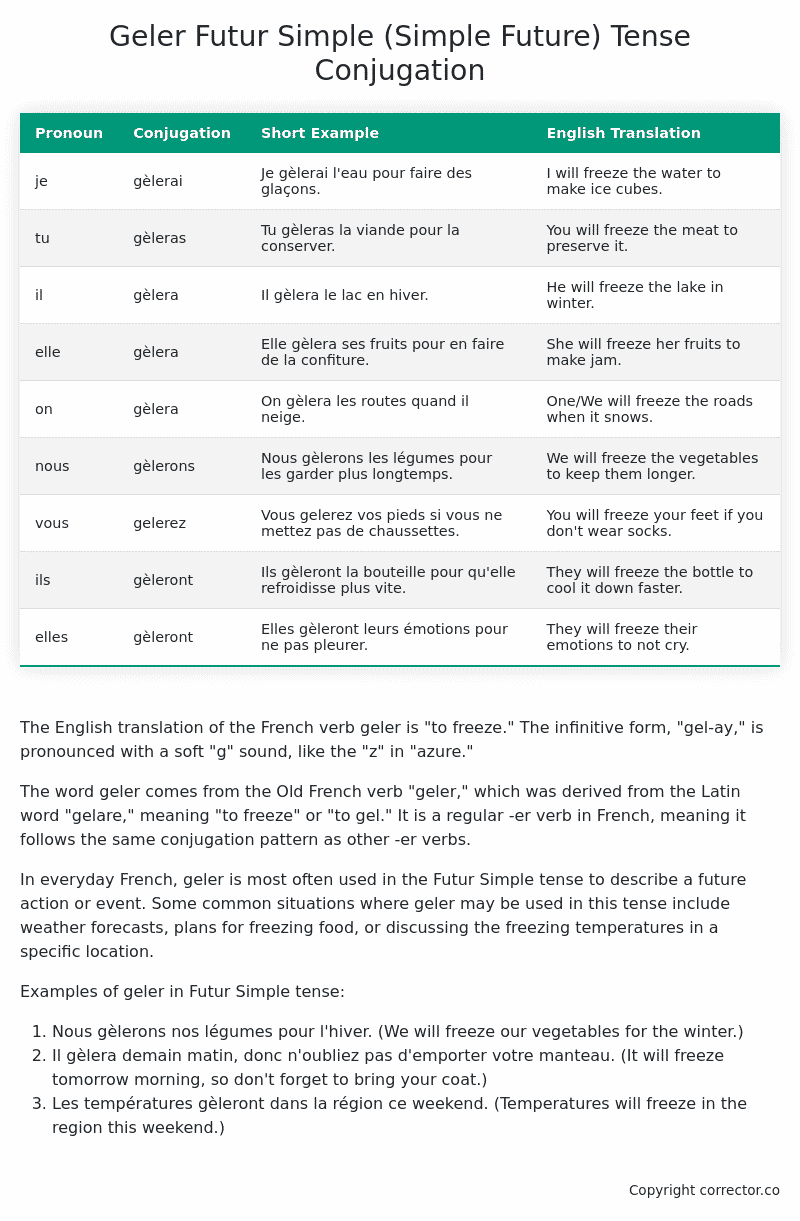Futur Simple (Simple Future) Tense Conjugation of the French Verb geler
Introduction to the verb geler
The English translation of the French verb geler is “to freeze.” The infinitive form, “gel-ay,” is pronounced with a soft “g” sound, like the “z” in “azure.”
The word geler comes from the Old French verb “geler,” which was derived from the Latin word “gelare,” meaning “to freeze” or “to gel.” It is a regular -er verb in French, meaning it follows the same conjugation pattern as other -er verbs.
In everyday French, geler is most often used in the Futur Simple tense to describe a future action or event. Some common situations where geler may be used in this tense include weather forecasts, plans for freezing food, or discussing the freezing temperatures in a specific location.
Examples of geler in Futur Simple tense:
- Nous gèlerons nos légumes pour l’hiver. (We will freeze our vegetables for the winter.)
- Il gèlera demain matin, donc n’oubliez pas d’emporter votre manteau. (It will freeze tomorrow morning, so don’t forget to bring your coat.)
- Les températures gèleront dans la région ce weekend. (Temperatures will freeze in the region this weekend.)
Table of the Futur Simple (Simple Future) Tense Conjugation of geler
| Pronoun | Conjugation | Short Example | English Translation |
|---|---|---|---|
| je | gèlerai | Je gèlerai l’eau pour faire des glaçons. | I will freeze the water to make ice cubes. |
| tu | gèleras | Tu gèleras la viande pour la conserver. | You will freeze the meat to preserve it. |
| il | gèlera | Il gèlera le lac en hiver. | He will freeze the lake in winter. |
| elle | gèlera | Elle gèlera ses fruits pour en faire de la confiture. | She will freeze her fruits to make jam. |
| on | gèlera | On gèlera les routes quand il neige. | One/We will freeze the roads when it snows. |
| nous | gèlerons | Nous gèlerons les légumes pour les garder plus longtemps. | We will freeze the vegetables to keep them longer. |
| vous | gelerez | Vous gelerez vos pieds si vous ne mettez pas de chaussettes. | You will freeze your feet if you don’t wear socks. |
| ils | gèleront | Ils gèleront la bouteille pour qu’elle refroidisse plus vite. | They will freeze the bottle to cool it down faster. |
| elles | gèleront | Elles gèleront leurs émotions pour ne pas pleurer. | They will freeze their emotions to not cry. |
Other Conjugations for Geler.
Le Present (Present Tense) Conjugation of the French Verb geler
Imparfait (Imperfect) Tense Conjugation of the French Verb geler
Passé Simple (Simple Past) Tense Conjugation of the French Verb geler
Passé Composé (Present Perfect) Tense Conjugation of the French Verb geler
Futur Simple (Simple Future) Tense Conjugation of the French Verb geler (this article)
Futur Proche (Near Future) Tense Conjugation of the French Verb geler
Plus-que-parfait (Pluperfect) Tense Conjugation of the French Verb geler
Passé Antérieur (Past Anterior) Tense Conjugation of the French Verb geler
Futur Antérieur (Future Anterior) Tense Conjugation of the French Verb geler
Subjonctif Présent (Subjunctive Present) Tense Conjugation of the French Verb geler
Subjonctif Passé (Subjunctive Past) Tense Conjugation of the French Verb geler
Subjonctif Imparfait (Subjunctive Imperfect) Tense Conjugation of the French Verb geler
Subjonctif Plus-que-parfait (Subjunctive Pluperfect) Tense Conjugation of the French Verb geler
Conditionnel Présent (Conditional Present) Tense Conjugation of the French Verb geler
Conditionnel Passé (Conditional Past) Tense Conjugation of the French Verb geler
L’impératif Présent (Imperative Present) Tense Conjugation of the French Verb geler
L’infinitif Présent (Infinitive Present) Tense Conjugation of the French Verb geler
Struggling with French verbs or the language in general? Why not use our free French Grammar Checker – no registration required!
Get a FREE Download Study Sheet of this Conjugation 🔥
Simply right click the image below, click “save image” and get your free reference for the geler Futur Simple tense conjugation!

Geler – About the French Futur Simple (Simple Future) Tense
Formation of Futur Simple
For regular -er verbs (e.g., parler – to speak)
For regular -ir verbs (e.g., finir – to finish)
For regular -re verbs (e.g., vendre – to sell)
Common Everyday Usage Patterns
Conditional Statements
Interactions with Other Tenses
Futur Antérieur
Conditional
Present
Summary
I hope you enjoyed this article on the verb geler. Still in a learning mood? Check out another TOTALLY random French verb conjugation!


